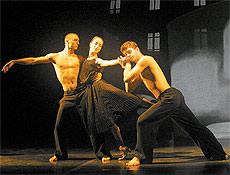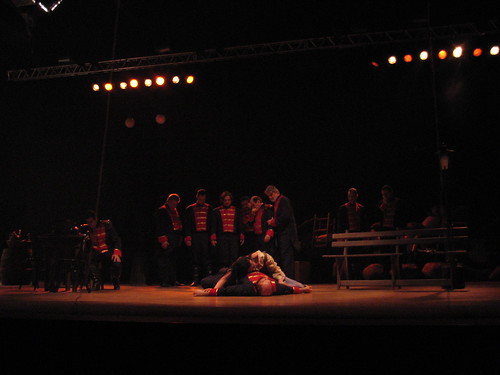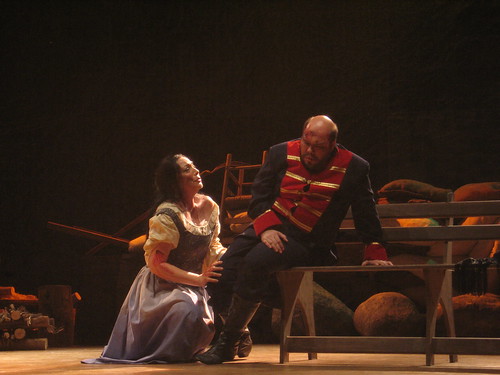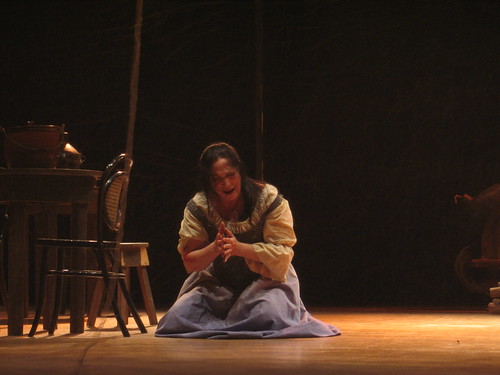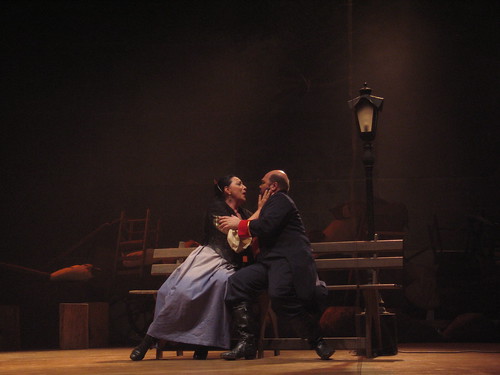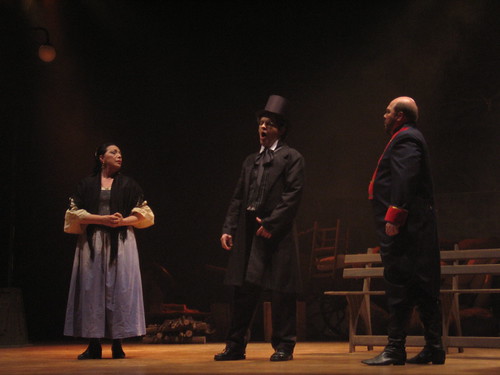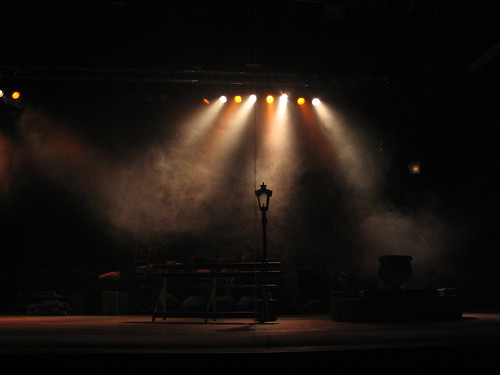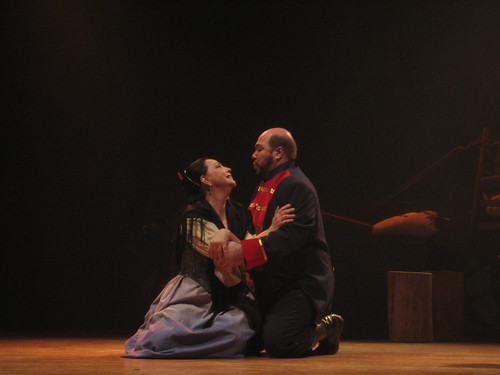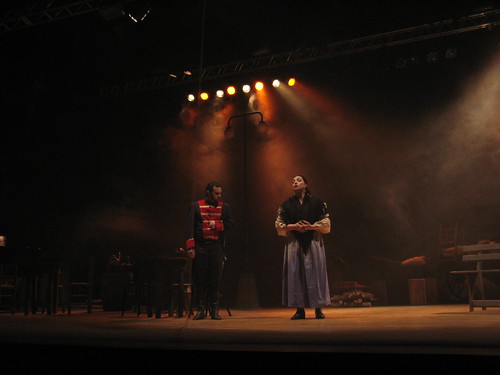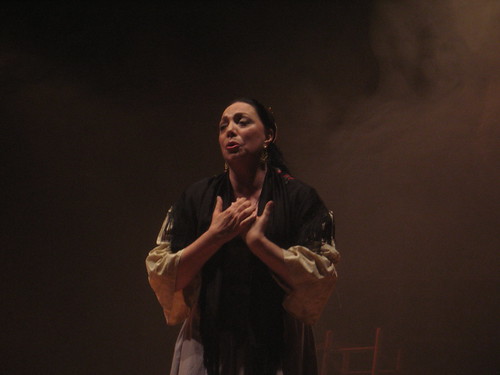
A different class of diva
By Norman Lebrecht / July 9, 2008
There are moments when an artist, seduced by the nuzzle of a radio mike, utters something so astonishing that the interviewer holds his breath and hopes to heaven that he has not misheard. ‘I got rid of my high notes,’ confides Natalie Dessay, in a backroom of the Theatre des Champs Elysees. ‘They were getting in the way.’
Dessay, 43, is an international operatic sensation. The first French singer to open a season at the Metropolitan Opera, saving a rickety production from director blight, she is by far the most versatile, surprising actress to be seen on an opera stage.
As blood-smeared tragedienne in Donizetti’s Lucia di Lamermoor in New York, or as light comedienne in Fille du Regiment at Covent Garden, Dessay’s madcap energy and gamine magnetism catch the eye even as Juan Diego Florez lets off nine top C’s in Fille and the audience roars to its feet. Dessay and Florez have erased Joan Sutherland and Luciano Pavarotti from Fille memory. Natalie’s pixie features wink out at you from Manhattan bus-stops. She, more than any current soprano, can give an opera a different twist.
So why drop the top notes? Every singer I have ever known works like crazy to get as high as they can and, once there, to polish the notes like brass knockers and use them as a juggernaut. That, however, is not what Natalie Dessay is about.
‘It is very easy for someone with high notes to impress,’ she shrugs, ‘even if the rest is not very interesting. High notes are something that people seem to like - I never understood why. It’s like being able to fly. OK, you can fly, so what?’ ‘It’s rather unusual,’ I interject. ‘Yes, it’s rather good but it’s not enough. I want to give something else. When I had these high notes, I couldn’t pay attention to the text. I’m interested in the humanity of the characters and the interpretation.’ ‘So when you’re standing opposite Juan Diego and he is doing nine high C’s…’ ‘I’m not impressed,’ exclaims Natalie Dessay with absolute conviction. ‘Either you have the top or not. If you have it, it’s not that difficult.’
This, I suspect, is about as close as you can get to heresy in opera without calling Verdi second-rate and saying Wagner was composed by committee. Dissing the upper altitudes of the human voice undermines opera’s unique selling point and the careers of its leading celebrities. Not that Dessay seems bothered.
This is a singer who gets rid of bankable roles before they start to bore her – ‘after four or five productions, what can you add?’ – or if a bigger challenge turns up. She has just turned down Lucia the Royal Opera House because she wants to act in a Paris stage play, her first spoken role. Looking for a candidate to kick off the new Lebrecht Interview series on BBC Radio 3, Dessay was first choice. Few singers so readily challenge conventional wisdom, and are so eager to be honest with themselves.
Who is Natalie Dessay? The name is not the one she was born with, and she is quick to admit that she uses it as an alter ego, to protect her real self from the one that goes on stage. She was born Nathalie Dessaix and changed it because the ‘h’ in her forename looked phoney and she was taunted in school as ‘deux-Sexe’, or two sexes. She wanted to be a ballerina at five, then an actor at 13. She found her singing voice at 20 while rehearsing a play. She won a Mozart competition in Austria and learned all she needed to know about the repertoire system during a season at the Vienna State Opera. ‘They are not interested much in theatre, only in music,’ she sniffs.
Lucky breaks launched her in Paris and New York in the mid-1990s but raging ambition – ‘I need so much to be on stage’ - was marred by weak confidence. ‘Can’t they hear I’m not that good?’ she kept asking herself.
Marrying the baritone Laurent Naouri gave her two children and a confidence boost. ‘It was not a coup de foudre,’ she giggles when I ask if she fell in love, ‘but that’s why I married my husband. I knew it could last. I believe we can grow old together.’
She converted to Naouri’s faith, Judaism, despite insisting that she did not believe in God. ‘And now, somehow, I feel Jewish. I like this culture, I like the humour, I like the way of seeing the world, the importance of family. I used to be egocentric. Through this, I learned the importance of being with others, of sharing.’
She is happiest working with her best friends, the conductor Emmanuelle Haim and the director Laurent Pelli, whom she describes as her sister and brother, and the opera she is most looking forward to is a Handel Giulio Cesare that they will do together in Paris at the end of next year. ‘On stage, in rehearsal,’ she explains, ‘my job is to help the conductor and the director to build a team with people from different backgrounds. I am the go-between.’
Come again? Is this a diva speaking? Could you imagine Maria Callas describing herself as a facilitator, rather than a star? ‘It’s in my interest,’ says Dessay matter-of-factly. ‘If everybody works together, maybe there’s a chance we can achieve something. If we work alone, there’s no chance.’ She often clashes with conductors who demand musical purity at the expense of dramatic effect. Her fantasy is to play Lady Macbeth – Shakespeare’s, not Verdi’s. Every time she steps on stage she reminds herself that art is long, and life short.
Seven years ago, while rehearsing in Toulouse, she went to see a throat specialist with a minor discomfort and was told she had polyps on the vocal cords and might never sing again. ‘I was desperate. I started to cry. I thought it was over. The date was September 11, 2001. I turned on the radio and heard this terrible news from New York. I stopped crying completely. I thought: what I have is nothing compared to this. I was alive, I am alive.’
Two operations, with eight months of rehab after each one, brought her slowly back to the international stage, and on to greater things. She knows the voice is finite and torments herself about what she will do when she gives up singing and has half a life left ahead. She drops another casual bombshell into our conversation. ‘I have given up solo recitals. I don’t like to be alone on stage.’
What she craves is to leave a lasting impact on the way that opera is presented. ‘I want to make people forget we are singing,’ says Natalie Dessay, ‘I don’t want to them to come to hear beautiful voices, but to see a whole performance, of theatre with music.’ There has never been a diva quite like her, for putting vanity in the shade.
+ The Lebrecht Interview starts on July 21 at 9.45pm, after the Monday Prom on BBC Radio 3 and will be streamed at www.bbc.co.uk/radio3



